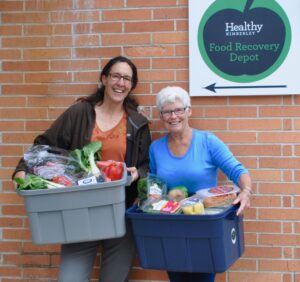Dr. Ilona Hale’s passion for rural life, rural medicine, and rural health research is infectious. Having grown up in Lively, Ontario, she always assumed that she would end up working and living in a small town.
“Everything in my life makes rural the right choice for me,” explains Dr. Hale from her home in Kimberley, British Columbia (BC), where she has practiced family medicine since 1997. “I love being active in nature, I like quiet, I love community and knowing my neighbours, and I love the interesting variety and the challenges you get as a rural doctor when the nearest specialist isn’t just down the hall. You have to stretch yourself professionally a bit more.”

The more you speak with Dr. Hale, the more you understand her proclivity for a good challenge. She is an avid sports enthusiast who also loves cooking, gardening, photography and singing in the local choir. In 2007, she and her family headed to Malawi for two years where she worked in a rural district hospital. And, more recently, while continuing to provide care for her rural patients, she found herself hungry for another new professional challenge—research.
“It’s fun to be nerdy and talk research,” laughs Dr. Hale. “I love the ‘ah-has’. Research can be surprisingly complex.”
In 2017, Dr. Hale enrolled in the University of British Columbia’s (UBC) two-year Clinicians Scholar Program. After publishing her first study, Parents’ Perceptions of Obesity Prevention During Infancy: A Qualitative Study, in the Canadian Medical Association Journal, she knew she was hooked. After successfully completing the Clinician Scholar Program, Dr. Hale embarked on Western University’s Transdisciplinary Understanding and Training on Research–Primary Health Care (TUTOR-PHC), wrapping it up in 2020.
It was these research chops and credentials that caught the attention of Dr. David Snadden, who selected Dr. Hale as his replacement as Director of the Rural Scholars Program in 2020. The Rural Scholars Program, funded by the Joint Standing Committee on Rural Issues under the partnership of UBC’s Department of Family Practice and the Rural Coordination Centre of BC, provides rural clinicians with the opportunity to develop scholarship and leadership skills—and, ultimately, get them started in the field of rural research. This, explains Dr. Hale, is crucial for producing quality, accurate and relevant rural research.
“Getting into research can be daunting for a rural clinician, so they don’t do it,” she says. “But it’s critically important for rural research to be conducted by rural researchers, rather than by people sitting in Vancouver, who might not understand rural communities, or might not ask the right questions. The more we can help rural clinicians learn research skills, the more they’ll realize it’s doable, and the more they’ll do it.”
The Rural Scholars Program takes a broad approach to learning. It allows Scholars to delve into any rurally-relevant category of scholarship—from discovery, integration, applications/engagement, or education. Scholars are selected based on their experience and involvement in policy and program development, advocacy, and education in rural communities. They dedicate one day a week to their research and are encouraged to provide local leadership and mentorship.
Currently, as Director of the Rural Scholars Program, Dr. Hale provides research leadership to two Scholars: Liz Morrison, a Registered Midwife, who is studying the patient experience of emergency intrapartum transfer from rural communities in Southern Vancouver Island, and Amanda Green, a Registered Nurse, who is examining patient experiences with multidisciplinary primary care maternity teams in rural BC. Each began the Rural Scholars Program in 2020 and are among the first Rural Scholars from a health discipline outside of medicine.
“This multi-disciplinary mix is a bit of a departure for the Program,” says Dr. Hale. “Other health professionals are trained differently than physicians and may take a slightly different approach to healthcare. That makes an important difference to how research is done—it makes it better. We all work together as teams to care for patients, so it makes sense that we all have something important to contribute to the research process, as well.”
To guide her work in supporting the Rural Scholars’ growth and contribution to rural healthcare sustainability, Dr. Hale reflects on the positive examples set by her own research mentors from the Clinicians Scholars Program and TUTOR–PHC.
“I do love teaching, mentoring and working with rural researchers,” she says. “I’m so grateful to my former supervisors, Dr. Wendy Norman and Dr. Stefan Grzybowski. They helped me with so many ‘ah-has’, and now I can do the same for the Rural Scholars. The Rural Scholars teach me, as well.”
For rural clinicians who might be interested in pursuing rural research with Dr. Hale and the Rural Scholars Program, the next opportunity is just around the corner. Applications for the Rural Scholarship Program will soon be accepted in Autumn 2021. Successful candidates will start their research at the beginning of 2022.
For more information about the Rural Scholars Program, visit its website, or email Dr. Hale directly.